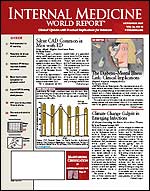Publication
Article
Internal Medicine World Report
HPV Vaccine Protects Against 10 "Other" Strains
Author(s):
By John Schieszer
CHICAGO—There is no physician today who is not aware that a 3-dose regimen of the quadrivalent vaccine (Gardasil) is the best protection available today against cervicogenital disease caused by the human papillomavirus (HPV) types 6, 11, 16, and 18. Now new data show that this vaccine also offers some protection against 10 other HPV strains, researchers reported at the Interscience Conference on Antimicrobial Agents and Chemotherapy.
The new evidence demonstrates a variable degree of efficacy against HPV types 31, 33, 35, 39, 45, 51, 52, 56, 58, and 59. These 10 HPV types are responsible for >20% of cervical cancer cases worldwide.
"We found approximately 38% vaccine efficacy in preventing disease caused by these additional 10 oncogenic HPV types. The highest efficacy was in protection against close cousins of HPV 16, for example, HPV type 31," said coinvestigator Darren Brown, MD, professor of medicine, microbiology, and immunology at Indiana University, Indianapolis.
When administered to HPV-na?ve 16- to 26-year-old women, the vaccine provides up to 100% protection against cervical precancer and noninvasive cervical cancer caused by HPV types 16 and 18, which are responsible for 70% of all cervical cancer cases. The vaccine also effectively prevents genital warts caused by HPV types 6 and 11, which are responsible for 90% of all genital warts cases.
In this new study, the vaccine also provided cross-protection against cervical disease in women with a negative Pap test who tested negative for 14 common HPV types at day 1. This phase 3 study combined results from FUTURE (Females United to Unilaterally Reduce Endo/Ectocervical Disease) I and II, which are prospective, double-blind, placebo-controlled, randomized trials involving 17,599 women (aged 16-23 years) from 16 countries.
IMWR
"The take-home message is that we have shown a type of cross-protection that will provide an extra measure of protection for women treated with the quadrivalent HPV vaccine Gardasil," Dr Brown told . "We need more research to look at head and neck cancers and also look at protection in men. There is still a lot that needs to be done."
Oral HPV infection is the strongest risk factor for the disease, regardless of tobacco and alcohol use. Having multiple oral sex partners tops the list of sexual practices that boost the risk for HPV-linked cancer. Gardasil has not yet been shown to prevent HPV infection in boys and men or to prevent oral HPV infection or oral cancer, which are more common in men.





